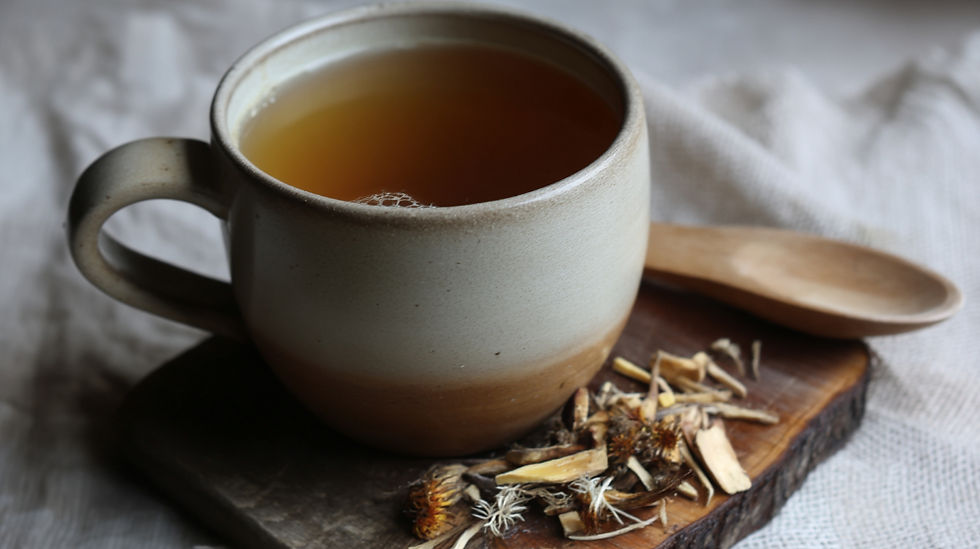"Rejuvenate Your Body: The Gentle Power of a Dandelion Root Tea Cleanse"
- Apr 29, 2025
- 7 min read

Feeling Sluggish? Discover a Gentle Path to Renewal
Do you ever feel like your body just needs a gentle reset? In our busy lives, it's easy to feel a bit weighed down, sluggish, or simply out of sync. While the wellness world buzzes with intense detoxes and extreme diets, sometimes what we truly crave is a softer, more supportive approach to feeling refreshed. If you're nodding along, perhaps it's time to explore the quiet power of a humble, yet historically revered plant: the dandelion.
Often dismissed as a common weed, dandelion root has been used for centuries in traditional practices around the world to support well-being. Forget harsh protocols; we're talking about incorporating a simple, natural brew – dandelion root tea – into your routine. This article will guide you through the concept of a dandelion root tea cleanse, focusing on its potential benefits as a gentle way to support your body's natural processes and invite a sense of rejuvenation. Let's brew a cup and explore together.
What Exactly is Dandelion Root Tea?
Before we dive into the "cleanse" aspect, let's get properly acquainted with our star ingredient. Dandelion ( Taraxacum officinale) might be that cheerful yellow flower dotting lawns, but its true treasures lie hidden beneath the soil. Dandelion root tea is made from the dried, and often roasted, taproot of the plant. This is distinct from dandelion leaf tea, which comes from the greens and tends to have a different profile and uses (often more focused on diuretic properties).
For centuries, various cultures have utilized dandelion root for its perceived wellness benefits, particularly related to digestion and liver health. When brewed, the root releases compounds that give the tea a unique flavor profile – typically earthy, somewhat chicory-like (especially if roasted), and carrying a characteristic subtle bitterness. This bitterness, as we'll see, is actually key to some of its traditional uses!
Gentle Cleanse vs. Harsh Detox: Understanding the Difference
The word "cleanse" or "detox" can conjure up images of severe restriction, juice-only fasts, or questionable supplements. Let's be clear: that's not what we're advocating for here. When we talk about a dandelion root tea cleanse, we're referring to a short period of intentionally incorporating this herbal tea to support and assist your body's own incredibly efficient detoxification systems.
Think of it less like a forced scrubbing and more like giving your internal housekeeping crew (your liver, kidneys, digestive tract) some helpful tools. Your body is designed to neutralize and eliminate waste products constantly. A gentle cleanse aims to:
Support these natural pathways, not override them.
Nourish your body with potentially beneficial plant compounds.
Encourage mindful habits like hydration and whole foods alongside the tea.
Avoid the stress and potential nutrient deficiencies associated with extreme detox diets.
It’s about working with your body's innate wisdom, using the gentle power of nature to help you feel your best.
Unveiling the Potential Benefits of Dandelion Root Tea
So, how might incorporating dandelion root tea gently support that feeling of rejuvenation? While large-scale human clinical trials are often limited for traditional herbal remedies, existing research and centuries of use point towards several potential benefits, particularly relevant in the context of a gentle cleanse:
Supporting Your Body's Natural Filter: The Liver
Traditionally, dandelion root is perhaps best known for its connection to liver health. The liver is a powerhouse organ, crucial for filtering blood, metabolizing nutrients, and processing waste. Some studies (often in vitro or animal models) suggest compounds in dandelion may help protect liver cells and support bile flow, which is essential for digestion and toxin elimination. While not a "liver detox" in the pop-culture sense, supporting overall liver function is key to feeling well.
Easing Digestion and Soothing Bloat
Remember that characteristic bitterness? Bitter flavors have a fascinating effect on our digestion. They can stimulate the production of saliva, stomach acid, and digestive enzymes, potentially improving nutrient absorption and promoting smoother digestion. Dandelion root also contains inulin, a type of prebiotic fiber that feeds beneficial gut bacteria, further supporting digestive health. This gentle digestive boost may help ease feelings of sluggishness or uncomfortable bloating.
Aiding Natural Fluid Balance
Dandelion root is known for its natural diuretic properties, meaning it can help your body release excess water by increasing urine output. This is primarily attributed to its high potassium content, which can help counterbalance sodium levels. If you sometimes feel puffy or retain water, incorporating dandelion root tea might offer gentle relief, helping you feel lighter and more balanced.
A Surprising Source of Nutrients
Beyond its specific actions, dandelion root itself contains valuable nutrients. It's a source of vitamins like A, C, and K, as well as minerals including iron, calcium, magnesium, and notably, potassium. While a cup of tea won't replace a balanced diet, it contributes beneficial micronutrients to your overall intake.

How to Mindfully Approach Your Dandelion Root Tea Cleanse
Ready to give it a try? Approaching your dandelion root tea cleanse mindfully is key. Here’s a simple guide:
Choosing Your Tea: Quality Matters
Look for 100% dried dandelion root. You can find it in several forms:
Cut and sifted loose root: Often preferred for freshness and potency. Requires an infuser.
Roasted dandelion root: Offers a deeper, more coffee-like flavor. Can be brewed similarly.
Tea bags: Convenient, but ensure they contain only dandelion root without unnecessary fillers.
Opt for organic whenever possible to minimize pesticide exposure, especially since you're focusing on wellness. Reputable herbal suppliers are your best bet.
Brewing the Perfect Cup
How-To Start
Brewing root tea requires a bit more time than leaf tea to extract the beneficial compounds.
Step 1: Measure: Use about 1-2 teaspoons of dried dandelion root per cup (8 oz / 240 ml) of water.
Step 2: Heat Water: Bring fresh, cold water to a boil.
Step 3: Steep: Place the root in an infuser or directly in a pot. Pour the boiling water over the root.
Step 4: Cover & Wait: Cover the cup or pot to keep the volatile oils in. Let it steep for at least 5-10 minutes. Some prefer a longer infusion (up to 15 minutes) or even a gentle simmer on the stovetop for 5-10 minutes for maximum extraction.
Step 5: Strain & Enjoy: Strain the tea (if using loose root) and enjoy it warm. You can add a touch of honey or lemon if desired, but try it plain first to appreciate its natural flavor.
How-To End
Finding Your Rhythm: Duration and Frequency
A gentle dandelion root tea cleanse isn't about drinking gallons of tea indefinitely. It's a focused, short-term practice.
Start slowly: Begin with one cup per day to see how your body responds.
Typical duration: Most people incorporate 1-3 cups daily for a period of 3 to 7 days.
Listen to your body: This is paramount. If you experience any discomfort, reduce the amount or stop. This is meant to feel supportive, not strenuous.
It's not a meal replacement: Dandelion root tea contains virtually no calories. Continue eating balanced meals.
Supporting Your Cleanse: Simple Lifestyle Tips
To enhance the feeling of rejuvenation during your cleanse period, consider these simple additions:
Hydrate: Drink plenty of plain water throughout the day. Herbal tea contributes to hydration, but pure water is essential.
Eat Mindfully: Focus on whole, unprocessed foods – fruits, vegetables, lean proteins, healthy fats. Reducing sugar, fried foods, and excessive processed items can lighten the load on your digestive system and liver.
Gentle Movement: Incorporate light activity like walking or stretching.
Rest: Prioritize adequate sleep, as this is when your body does much of its repair and recovery work.
Important Considerations: Safety and Who Should Be Cautious
While generally considered safe for most people when consumed in moderation, dandelion root tea isn't suitable for everyone. It's crucial to be aware of potential side effects and contraindications:
Potential Side Effects to Note
Allergies: If you're allergic to related plants in the Asteraceae family (like ragweed, chrysanthemums, marigolds, daisies), you might react to dandelion. Start with a small amount if unsure.
Diuretic Effect: Increased urination is expected. Ensure you're hydrating adequately.
Stomach Upset: Some individuals may experience mild stomach discomfort, heartburn, or diarrhea.
Interaction with Bile Flow: Because it can stimulate bile, it might cause issues for those with specific gallbladder problems.
When to Skip or Consult Your Doctor
Pregnancy and Breastfeeding: Due to lack of sufficient safety data, it's best to avoid dandelion root tea during these times unless approved by a healthcare provider.
Bile Duct Obstruction or Gallstones: Avoid use, as increased bile flow could worsen the situation.
Kidney Disease: The diuretic effect and potassium content may be problematic for those with impaired kidney function. Consult your doctor.
Medication Interactions: Dandelion root can potentially interact with:
Diuretics: May amplify the effect.
Blood Thinners (e.g., Warfarin): Contains Vitamin K, which could interfere.
Lithium: May affect how the body eliminates lithium.
Diabetes Medications: May potentially lower blood sugar; monitor levels closely if combining.
Antibiotics (Quinolones): May affect absorption.
Medications broken down by the liver: Potential for interaction.
***Disclaimer: The information in this article is for educational purposes only and is not intended as medical advice. Always 1 consult with a qualified healthcare professional 2 before starting any new herbal remedy, cleanse, or supplement regimen, especially if you have pre-existing health conditions, are taking medications, or are pregnant or breastfeeding.***
Ready to Gently Rejuvenate?
Embarking on a dandelion root tea cleanse is less about drastic measures and more about tuning into your body's needs with gentle, natural support. By understanding its potential benefits, preparing it correctly, and being mindful of safety, you can explore this traditional remedy as a way to encourage digestive comfort, support your body's natural filtering processes, and invite a subtle sense of renewal.
Remember, the goal is gentle support, not forced change. Enjoy the ritual of brewing and sipping your tea, pair it with healthy habits, and listen to what your body tells you. Sometimes, the simplest practices rooted in nature offer the most profound sense of well-being.
Explore More: Read our related post on "Tea for Digestion Wellness" or "Easy DIY Detox Tea Recipes for a Healthy Reset".





Comments